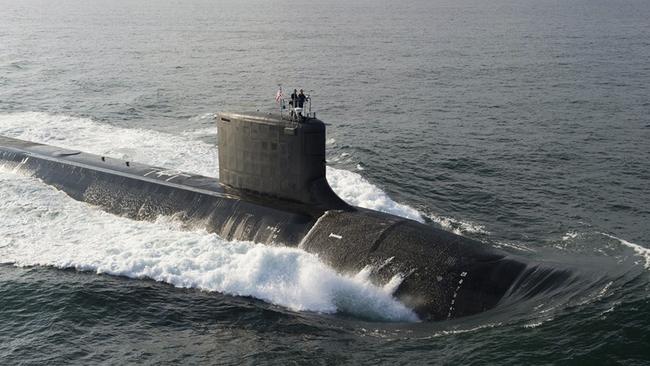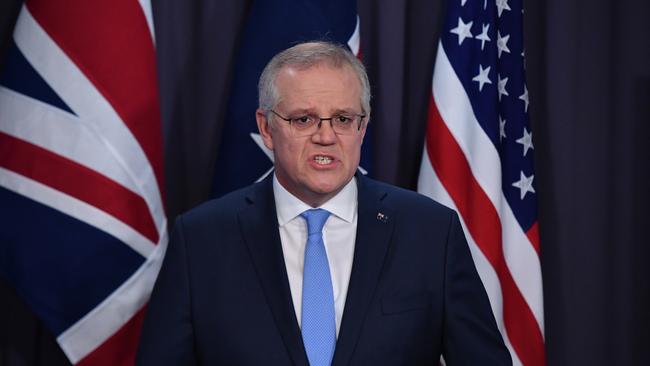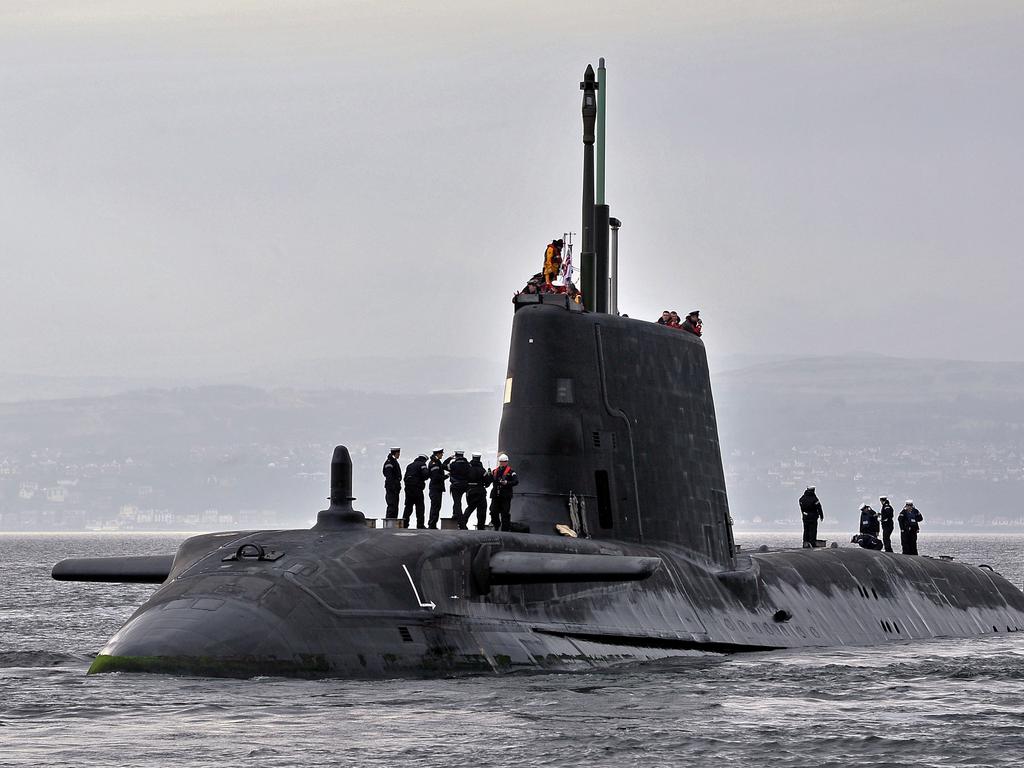AUKUS alliance: Nuclear-powered subs will arrive much too late to help us in conflict
If everything goes perfectly well – and how likely is that? – we get the first of these nuclear subs around, or just before, 2040.

They don’t love war. Each loves peace. But they don’t shirk the burden of defending democracy and national survival.
Having said that, AUKUS is almost entirely symbolic. Its headline announcement, its revolutionary commitment, is that the US and Britain will offer their nuclear submarine technology to Australia.
Forget the emotion, let’s deal with reality. If everything goes perfectly well – and how likely is that? – we get the first of these nuclear subs around, or just before, 2040.
Scott Morrison and Defence Minister Peter Dutton frequently and justifiably compare our time with the 1930s. Military conflict is not inevitable. But the situation in the Indo-Pacific is as dangerous as the ’30s.
If you were in charge of British security policy in 1938, how serious would your response be if you embarked on a program that delivered the first additional weapon in 1958?
The Morrison government is doing more to augment our defence capabilities than any government since John Howard’s. It is not remotely doing enough to confront the situation it repeatedly tells us we face.

After eight years of conservative government we have done precisely nothing on acquiring new submarines. Which follows six years of Labor government in which we also did precisely nothing. The whole submarine fiasco is a farce, a national embarrassment.
It’s important, nonetheless, to acknowledge the other things the Morrison government is doing. It’s improving and updating our defence force. It’s not acquiring new platforms, or changing the defence force structure, or increasing the defence force.
We are just doing what we always do, slowly updating and improving our old, old defence force structure, which we had in the long balmy days when, as the PM puts it, there was a “benign security environment in the Indo-Pacific”.
Within those foolish limits, the Morrison government is energetic and forward-leaning. The underlying defence strategy – which is that whatever happens the Americans will defend us – is still obviously the real, if not the declared, defence strategy today, just as it has been since 1942. That’s why the real import of AUKUS is symbolic and political.
The government has announced and re-announced some good moves from our familiar defence repertoire and got support for them at the AUSMIN meeting in Washington involving the defence and foreign affairs ministers of both countries.
When the PM announced the nuclear subs initiative he also announced we would be putting long-range Tomahawk missiles on our Air Warfare Destroyers. The AWDs will need their weapons systems upgraded first, but it’s a good move. We’re also getting long-range anti-ship missiles for our Super Hornets, extended-range (900km) Joint Air-to-Surface Missiles for our Hornets and Joint Strike Fighters, and long-range (400km) missiles for the army. That’s all good stuff.
The AUSMIN communique importantly registered official US support for the government’s initiative to build a guided missile construction facility in Australia, to build American missiles here. This is a very good initiative. Its main purpose is for us to build more missiles for our own use, but they also could go to other US regional allies or even supplement the US’s own capacity for its home market if its production ever runs short of its needs.
This is an essential part of Australia attempting to become more organically part of the US’s own strategic industrial capacity. This has countless benefits. We can do more work as part of US-led alliance-wide industrial co-operation. Britain is the US’s most intimate and important partner and the three-way integration is good for Australia.
But it makes any real difference to our own ability to provide for our security only if we actually build or acquire new weapons and new platforms.
The AUSMIN statement, and Dutton’s AUSMIN comments, also endorse the establishment of a “combined logistics, sustainment and capability for maintenance” enterprise in Australia. This leads us to the real military pay-off of all the symbolic stuff.
First, let’s note that the symbolism itself is hugely important. US President Joe Biden and UK PM Boris Johnson told their respective nations that Australian security is a high purpose of their own national policy, that Australia is their most intimate security and military partner, and that Australia is completely trustworthy with the most sensitive military technology – nuclear-propelled submarine technology – short of nuclear weapons themselves.
That all has real geo-strategic consequence in itself. But the real military consequence of AUKUS so far is the AUSMIN statement, and the similar statements by Dutton and US Defence Secretary Lloyd Austin that there would be increased US aircraft, naval and marine presence in northern Australia. Dutton explicitly canvassed basing US assets in Australia, presumably ships.
If we base one or more US ships in Australia, or if we sufficiently increase the rotation of US aircraft and marines, then we effectively increase the military deterrent qualities that apply to Australia. We have, as it were, armed ourselves with Americans.
That, of course, is what we always do. And we are not exactly exploiting our allies here. It suits the US interest in having a more dispersed force structure in the Indo-Pacific, with substantial resources beyond the immediate reach of Chinese missiles.
But let’s not for a single instant think that this means we are doing more things on our own behalf. Our policy action is basically to enable and encourage the Americans to do more things for us. That’s sensible enough. In fact it’s good and innovative policy. But we should be doing much, much more for ourselves.
Reliable sources tell Inquirer there will be Australian sailors serving on US Virginia-class nuclear submarines in preparation for our acquiring these capabilities ourselves. We will have to put very young sailors indeed on these American boats if we expect them to serve on Australian boats one day, as we won’t have any new boats of our own for decades yet. Instead the real significance of these mixed crew joint deployments is enhanced integration of US and Australian defence forces.
In the words of Hilaire Belloc, we stick close to nurse, for fear of finding something worse.
So back to subs, the real meaning of AUKUS, and the politics. The politics of all this helps the government. It dispenses with the French subs, which had become toxic, especially among Coalition voters. The external change is how threatening China has become. This led to the three historic AUKUS changes. One, the US is willing to share nuclear sub technology for only the second time in its history. Two, an Australian government will embark on nuclear submarines, which are expensive and challenging. And three, for the first time, Labor has endorsed nuclear-propelled submarines for Australia.
Anthony Albanese has made the right decision here and deserves recognition for it. But he will be relentlessly attacked on the left. He could well bleed votes on his left to the Greens. This will hardly distress the government.
AUKUS allegedly gives Australia much greater intimacy with the US system and greater access to US technology. No doubt this is true. Artificial intelligence, quantum computing, machine learning, hypersonic weapons – these technologies didn’t exist five minutes ago. But for as long as I’ve been a journalist (which is a long time now) Australian prime ministers have been telling us about the new intimacy they achieve in Australia-US military co-operation. In my view there was never more intimate co-operation between a president and PM than between George W. Bush and John Howard, unless it was between Lyndon Johnson and Harold Holt. AUKUS is good, but it sits in a long Australian tradition, it’s hardly revolutionary.
Now everyone, not least me, is excited by the radical new capability that nuclear subs bring. But remember, we don’t get a nuclear sub until 2040 or thereabouts, and that’s if everything goes well and all the governments between now and then that will succeed the Morrison government remain committed to the project.
And what do we have in the meantime?
From the middle of this decade the six Collins-class boats begin their life-of-type extension. Each sub will go in, one after another, for two years of refurbishment and rebuilding. That means from 2025 to 2035 we will have not six ageing subs but five.
And that means we will struggle to consistently deploy two ancient Collins-class subs at any one time – and this, remember, for the decade that is as dangerous as the 1930s.
If submarines are important to our security, and this decade is as dangerous as the 1930s, then our national policy is a joke.
The national Australian failure on submarines is simultaneously a tragedy, a farce, a national embarrassment and a disgrace for which both sides of politics should hang their heads in shame. It’s a national failure that may yet compromise Australia’s future as an independent sovereign nation.
Since Paul Keating, every prime minister has attacked or assassinated the submarines of his or her predecessor. Bob Hawke commissioned the six Collins subs.
The Keating government, already getting stingy with defence expenditure, considered but rejected increasing the order from six to nine, yet six was manifestly inadequate for Australia.
The Howard government was generally good on national security but it disgracefully and relentlessly demonised the Collins subs to try to hurt then opposition leader Kim Beazley, with whom they were associated.
This broadcast weakness to our enemies and convinced the Australian people that big Australian defence projects were a joke. It was highly irresponsible.
Kevin Rudd rightly decided we needed 12 new regionally dominant subs. This was news to the navy, which couldn’t crew the six subs we already had (and still can’t), but it was the right decision. Julia Gillard trashed the Rudd project by radically starving Defence of money.
Tony Abbott tried to solve the problem by getting the Japanese to build us a fleet of subs. This involved deep strategic wisdom and would have integrated the US, Japan and Australia in submarine technology.
Malcolm Turnbull assassinated Abbott and sank Abbott’s Japanese subs. He contracted for French subs instead. Turnbull himself was assassinated in due course and now Morrison has sunk Turnbull’s French subs.
Each time a prime minister has killed off his predecessor’s subs, he has put back the acquisition of any actually physical new sub way into the distant future.
If we were a serious nation, we would have our post-Collins conventional subs fleet by now, and be ready to move on to nuclear subs.
After eight years of Liberal government we have done absolutely nothing on subs and all we are doing now is having a feasibility study over the next 18 months to work out what kind of nuclear sub we should get.
Free of charge, I can short-circuit the process for Defence. Just get the US Virginia-class, without any modifications. If we get the British Astute-class it will need huge modifications to install a US combat system. Any modification brings delay.
The project is not politically secure until we are well into the build. If we don’t start building for another nine years, that gives an enormous amount of time for opposition to the project to grow. Whoever succeeds Morrison as PM will likely not be interested in defending Morrison’s subs, just as, grotesquely, no one from the government ever defended the French subs once Turnbull was gone.
AUKUS is a good initiative. Don’t think for a moment it transforms our strategic outlook.
Don’t think for a moment we are doing anywhere near enough to address our disturbing strategic circumstances.







The historic Australia-United Kingdom-United States defence agreement – AUKUS – is a powerful statement of purpose by the three great Anglophone democracies, the three nations of the West that most often, and most seriously, have confronted the tasks of security, and for each of whom the legend, sacrifice, heroism of war are central to their national identities.